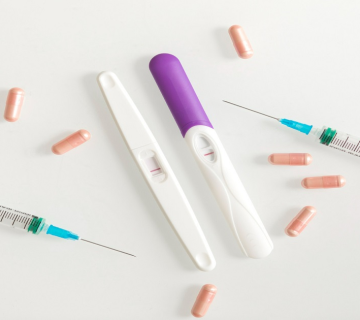
Understanding IVF Miscarriage
In vitro fertilization (IVF) has helped many couples achieve their dream of having a child. But while IVF can be an incredible medical breakthrough, it’s not always a straightforward path to parenthood. One of the emotional challenges faced by many who undergo IVF treatment is the risk of miscarriage. Although miscarriage can happen in any pregnancy, IVF pregnancies are not immune, and understanding why this happens can help you prepare for the process and cope with the potential challenges.
In this article, we will explore IVF miscarriage—its causes, how common it is, and what steps can be taken to prevent or manage it. By breaking down the facts and addressing common misconceptions, our goal is to provide clear and helpful insights into this sensitive topic.
What Is IVF Miscarriage?
A miscarriage is the loss of a pregnancy before the 20th week. For women undergoing IVF, a miscarriage can occur after the embryo transfer, when the fertilized egg is implanted in the uterus. Just like with natural conception, IVF pregnancies can also end in miscarriage, though the risks and causes may differ slightly.
A miscarriage after IVF is a deeply emotional experience for many couples. It’s important to note that IVF miscarriages are often not caused by anything the couple did wrong. Miscarriage can happen for various reasons, and understanding these reasons can be helpful in coping with the experience.
How Common Are IVF Miscarriages?
Miscarriage is a relatively common occurrence in pregnancies, and IVF is no exception. Studies suggest that the risk of miscarriage in IVF pregnancies is about 15% to 25%. This is similar to the natural miscarriage rate for women in their 30s and early 40s. However, the risk of miscarriage increases as a woman’s age increases. For women over 40, the miscarriage rate can be as high as 40% to 50%.
Dr. Jessica Miller, a fertility specialist, explains, “The risk of miscarriage in IVF is often tied to the woman’s age, the health of the embryos, and whether there are underlying medical conditions that affect pregnancy. It’s not uncommon for IVF pregnancies to end in miscarriage, especially if the embryo has chromosomal abnormalities.”
Causes of IVF Miscarriage
There are several factors that can contribute to miscarriage in an IVF pregnancy. Some of the most common causes include:
- Chromosomal Abnormalities: The most common reason for a miscarriage in any pregnancy is chromosomal abnormalities. If the embryo has an incorrect number of chromosomes, it is less likely to survive. Even with IVF, where embryos are carefully selected for transfer, chromosomal abnormalities can still occur.
- Embryo Quality: The quality of the embryo is another critical factor in the success of IVF. Higher-quality embryos have a better chance of implanting in the uterus and developing into a healthy pregnancy. Poor embryo quality—due to issues like fragmentation or abnormal cell development—can result in miscarriage.
- Age: As women age, the quality and quantity of their eggs decline, which can increase the risk of miscarriage. In IVF, older women may have a higher chance of chromosomal abnormalities, which can contribute to a miscarriage.
- Uterine Issues: Structural problems in the uterus, such as fibroids, polyps, or an abnormal shape, can affect the ability of the embryo to implant properly. These issues may increase the risk of miscarriage after IVF.
- Hormonal Imbalances: Proper hormonal support is crucial for maintaining a pregnancy. If a woman’s body doesn’t produce enough progesterone after embryo transfer, the uterine lining may not be able to support the pregnancy, leading to miscarriage.
- Immune System Issues: In some cases, the immune system may attack the developing embryo, leading to miscarriage. This can be more common in women with autoimmune conditions or certain immune system dysfunctions.
- Infections: Infections, although rare, can also lead to miscarriage. It’s essential to address any infections before undergoing IVF to reduce the risk.
- Lifestyle Factors: Smoking, excessive alcohol consumption, or drug use can also increase the risk of miscarriage, even with IVF.
Can IVF Miscarriages Be Prevented?
While miscarriage is not always preventable, there are steps that can be taken to reduce the risks:
- Genetic Screening: Many IVF clinics offer preimplantation genetic testing (PGT) to screen embryos for chromosomal abnormalities before transfer. This can help ensure that only healthy embryos are implanted, reducing the risk of miscarriage.
- Optimizing Egg Quality: Ensuring that you are in good health before starting IVF can improve your chances of having healthy eggs. A balanced diet, regular exercise, and managing stress levels can all help support fertility. If you are over 35, you may want to discuss with your doctor whether egg freezing or using donor eggs might be a viable option.
- Addressing Uterine Problems: If there are any underlying issues with the uterus, such as fibroids or polyps, it’s essential to address these before undergoing IVF. Treating these conditions can improve the chances of successful implantation and reduce the risk of miscarriage.
- Proper Hormonal Support: Ensuring that progesterone levels are adequately supported in the early stages of pregnancy can help reduce the risk of miscarriage. Your doctor may prescribe progesterone supplements after embryo transfer to support the uterine lining.
- Healthy Lifestyle: Maintaining a healthy lifestyle is essential when preparing for IVF. This includes quitting smoking, limiting alcohol, eating a nutritious diet, and managing any chronic conditions, such as diabetes or hypertension, that could affect the pregnancy.
What Happens After a Miscarriage?
Experiencing a miscarriage after IVF can be emotionally and physically draining. It’s essential to allow yourself time to grieve and seek support. Emotional support from a partner, friends, family, or a counselor can be helpful during this time.
Dr. Miller advises, “Miscarriage is incredibly painful, and it’s important to allow yourself to grieve and heal emotionally. IVF is an intense process, and it’s normal to feel a sense of loss after a miscarriage. Don’t hesitate to reach out for emotional or psychological support if needed.”
Physically, you will likely be monitored closely to ensure your body heals properly. In most cases, you can begin trying another IVF cycle after a few months, depending on how your body responds and your doctor’s advice.
Emotional Support and Moving Forward
While IVF miscarriage can be emotionally challenging, it’s important to keep in mind that it doesn’t mean that you can’t have a successful pregnancy in the future. Many couples who experience miscarriage with IVF go on to have healthy pregnancies in subsequent cycles.
“IVF miscarriage is not the end of the road. Many people have successful pregnancies after miscarriage, whether it’s through another IVF cycle or natural conception. It’s important to be patient and gentle with yourself through this journey,” says Dr. Miller.
Conclusion
IVF miscarriage is a heartbreaking experience, but understanding its causes and knowing that you’re not alone can be comforting. While not all miscarriages can be prevented, there are steps you can take to improve your chances of a successful pregnancy, such as genetic screening, improving egg quality, and maintaining a healthy lifestyle.
Remember, IVF is a process, and it’s okay to grieve, seek support, and give yourself time to heal. Your journey to parenthood may take time, but with patience, determination, and the support of your medical team, there is always hope for a successful outcome.




No comment